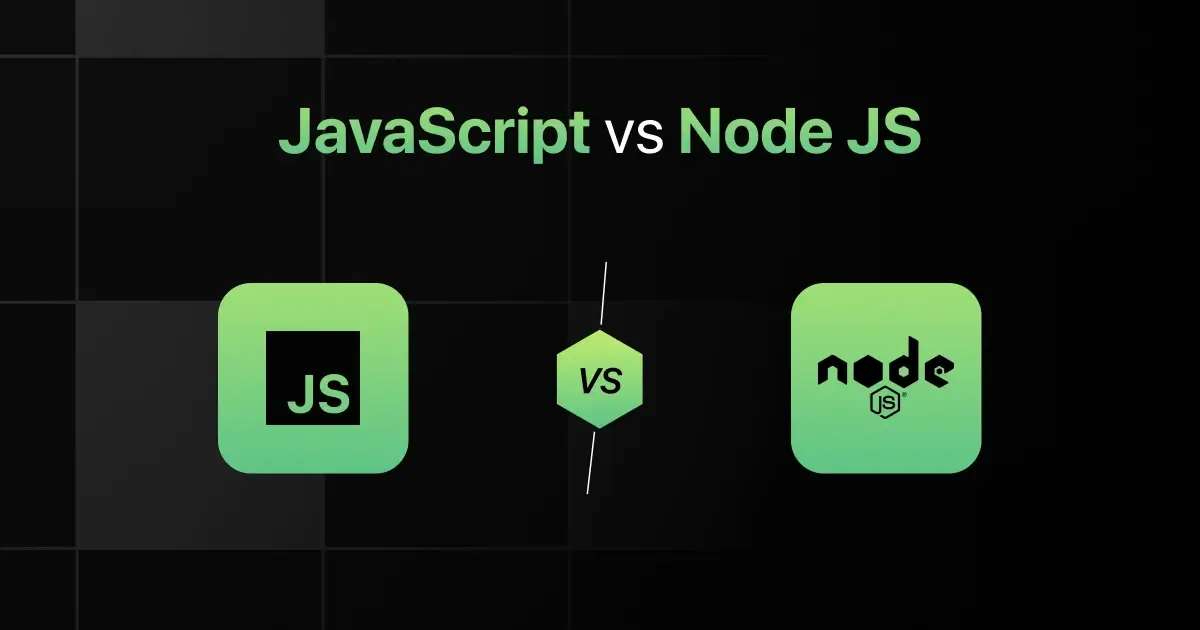JavaScript vs Node JS: Key Differences

When comparing JavaScript and NodeJS, it’s important to look at what sets them apart. The discussion about JavaScript vs NodeJS is common among programmers deciding which language to use for their projects.
The question of JavaScript vs NodeJs which is better? or JavaScript vs NodeJs which is best? depends on what you need for your specific project.
In this article, let’s know the differences between JavaScript and NodeJS.
JavaScript vs Node JS: Understanding the Key Differences
When comparing JavaScript and NodeJS, it’s crucial to understand the key distinctions that define their usage and capabilities.
One of the most important differences is that JavaScript is a dynamically typed language primarily used for client-side scripting in web browsers, whereas NodeJS is a runtime environment that allows JavaScript to be run server-side.
The following are other major differences between JavaScript and NodeJS:
| S. No. | Parameters | JavaScript | Node JS |
|---|---|---|---|
| 1 | Developed By | Netscape | Ryan Dahl |
| 2 | Release Year | 1995 | 2009 |
| 3 | Paradigm | Multi-paradigm: event-driven, functional, imperative | Multi-paradigm: event-driven, functional |
| 4 | Syntax | Standard ECMAScript syntax | Same as JavaScript, with some additional APIs for server-side features |
| 5 | Performance | Fast execution in web browsers | High performance in server-side applications due to non-blocking I/O |
| 6 | Applications and Use Cases | Client-side scripts for web pages, form validations, interactivity | Building server-side applications, APIs, real-time applications |
| 7 | Learning Curve | Relatively easy to start with basic functionalities | Slightly steeper due to backend concepts, though familiarity with JavaScript helps |
| 8 | Libraries and Frameworks | Numerous libraries and frameworks like React, Angular, Vue.js | Extensive package ecosystem with NPM, including Express, Koa |
| 9 | Platform Independence | Runs in any browser or any platform with a JavaScript engine | Platform-independent but requires a Node.js runtime environment |
| 10 | Concurrency and Multithreading | Single-threaded with an event loop for handling asynchronous operations | Single-threaded but uses worker threads for executing asynchronous code |
| 11 | Tooling and IDE Support | Extensive support across all major IDEs and text editors | Strong support, particularly with tools and IDEs that cater to server-side development |
| 12 | Memory Management | Managed by the JavaScript engine in the browser | Managed by V8 JavaScript engine, with considerations for server-side constraints |
| 13 | Error Handling | Error handling with try-catch and error events in the browser | Error handling using callbacks, promises, and async/await patterns |
| 14 | Security | Dependent on the browser's security model | Requires careful security measures for server-side, including dealing with dependencies and server vulnerabilities |
| 15 | Scalability | Scalable with asynchronous patterns and client-side optimizations | Highly scalable due to its non-blocking nature and ability to handle numerous connections simultaneously |
| 16 | Key Features | Interactivity on websites, dynamic content manipulation | Non-blocking I/O, event-driven architecture |
| 17 | Integration with Other Technologies | Integrates well with HTML/CSS and other client-side technologies | Integrates with databases, server frameworks, and various back-end tools |
| 18 | Community and Support | Very large and well-established community | Very active community with a large number of modules available through NPM |
| 19 | Job Opportunities | Extensive opportunities in web development roles | Strong demand for back-end and full-stack developers |
| 20 | Future Prospects | Continues to evolve with web standards | Continues to expand in capabilities and adoption for back-end and real-time applications |
JavaScript vs NodeJS: Which One to Choose?
Choosing between JavaScript and NodeJS can be challenging, but by understanding their distinct advantages, you can make an informed decision.
Choose JavaScript If:
- You aim for roles such as web developer, UI/UX developer, or mobile app developer, especially in startups, digital media agencies, and tech companies focusing on rapid deployment and prototyping.
- You appreciate a language with a massive ecosystem of libraries and frameworks like React, Node.js, and Express, which facilitate quick development across a range of applications from servers to client-side interfaces.
- You prioritize a language renowned for its fast execution speeds necessary for real-time web applications and dynamic website content, optimizing both time-to-interactive and overall user experience.
- You require a universally supported language that operates natively on all modern browsers and platforms, making it the standard choice for client-side scripting.
- You work on dynamic web projects, interactive websites, and real-time applications that benefit from JavaScript’s event-driven non-blocking architecture, making it ideal for tasks requiring high user interaction and data updates.
Choose NodeJS If:
- You are aiming for job roles such as backend developer, server-side developer, or in roles that involve building scalable network applications, prevalent in industries like technology, finance, and media.
- You prefer a runtime environment that comes with an extensive package ecosystem in npm, which provides libraries and tools for enhancing application development efficiency and capabilities in server-side scripting.
- You need a runtime known for its non-blocking I/O model which provides efficient data handling and speedy execution suitable for applications that require handling numerous simultaneous connections with high throughput.
- You seek to develop and run applications not only on various operating systems including Windows, Linux, and macOS but also on server environments, making NodeJS a versatile choice for cross-platform development.
- You are involved in projects that require building real-time web applications like chat applications and video streaming services, or where you need a fast and scalable server-side solution.
Final Words
The main difference between JavaScript and NodeJS lies in their design and use.
The purpose of understanding JavaScript and NodeJS differences is to choose the right tool for the job, depending on factors like the project’s size and how easy it is to maintain.
Frequently Asked Questions
1. What are the key differences between JavaScript and Node JS?
The key differences between JavaScript and NodeJS are:
- JavaScript is primarily used for client-side scripting in web browsers, whereas Node.js is a runtime environment that allows JavaScript to run on the server side.
- JavaScript in the browser uses an event-driven model suitable for UI interactions, whereas Node.js employs a non-blocking I/O model that makes it efficient for scalable network applications.
2. Which is better JavaScript or Node JS? Which one to choose?
It depends on your project requirements; use JavaScript for front-end development and Node.js for back-end server applications.
3. Which is faster, JavaScript or Node JS?
Node.js tends to be faster than JavaScript for server-side operations due to its non-blocking I/O model.
4. What are the primary use cases of JavaScript and Node JS?
The primary use cases of JavaScript and NodeJS are:
- JavaScript is primarily used for enhancing web pages and user interfaces.
- Node.js is used for server-side applications, APIs, and running scripts on the server.
5. Which one is easy to learn for Beginners, JavaScript or Node JS?
JavaScript is generally easier for beginners due to its straightforward application in web development and abundance of learning resources.
6. Can JavaScript and Node JS run on different platforms?
Yes, JavaScript runs in web browsers across different platforms, whereas Node.js runs on server-side environments like Windows, Linux, and macOS.
7. Can I develop mobile apps using JavaScript and Node JS?
Yes, you can develop mobile apps using both; JavaScript can be used with frameworks like React Native, and Node.js can handle back-end services.
8. What are the job prospects for JavaScript developers versus Node JS developers?
Job prospects are excellent for both; JavaScript developers can find roles in front-end development, while Node.js developers are sought after for back-end and full-stack positions.
Explore More JavaScript Resources
- JavaScript Learning Websites
- JavaScript Practice Websites
- JavaScript YouTube Channels
- JavaScript Project Ideas
- JavaScript Apps
- JavaScript IDEs
- JavaScript MCQ
Explore More Node JS Resources
Explore More Comparisons
Related Posts


Best Apps to Learn Web Development
Ever thought about building your own website or launching a career in tech but don’t know where to start? With the …










